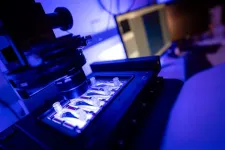(Press-News.org) A new study has uncovered that a gene variant common in Oceanian communities was misclassified as a potential cause of heart disease, highlighting the risk of the current diversity gap in genomics research which can pose a greater risk for misdiagnosis of people from non-European ancestries.
Led by the Garvan Institute of Medical Research and published in the European Heart Journal, the researchers describe the cases of two individuals of Pacific Island ancestries who carry a genetic variant previously thought to be a likely cause for their inherited cardiomyopathy, which the team found to be common among healthy individuals from Oceanian regions.
“Without greater inclusion of people of different ancestries, the benefits of genomics will continue to leave people of non-European descent behind, perpetuating existing gaps in healthcare,” says senior author Associate Professor Jodie Ingles, Head of the Clinical Genomics Lab and Director of the Genomics and Inherited Disease Program at Garvan.
“Our study reaffirms the dangers of having a lack of genetic diversity in genomic reference groups and points to our urgent need to invest time and resources to ensure no community is left behind.”
Rare gene variant found to be common
Between the DNA of any two people, there are millions of letter differences, or genetic variants. These variants determine our looks, how our body functions, but they can also influence our risk of disease, including some of the most common – heart disease, diabetes and some cancers.
While scientific advances in genomics have been transformative for our ability to diagnose and treat disease, most genetic studies have focused on people of European descent.
In the current report, Associate Professor Ingles’ team at the Garvan Institute investigated a genetic variant they found in two people with cardiomyopathies, who underwent research-based whole genome sequencing at a Sydney clinic. Cardiomyopathies are potentially fatal inherited heart conditions that make it harder for the heart to pump blood around the body, and affect up to one in 500 people.
The researchers found that the variant, in the cardiac troponin T gene, which plays a role in regulating heart muscle contractions, is extremely rare in large international population genomic databases.
“This meant that among seemingly healthy people, the variant is not often present. This can indicate it is the cause of an inherited disease, and indeed numerous clinical testing labs had already flagged this as a potential causative variant,” explains Dr Alexandra Butters, first author of the study.
“We became suspicious about this variant being the cause of the patients’ cardiomyopathy, and when we investigated this further with colleagues who had more genomic reference data of seemingly healthy individuals from various Oceanian regions (comprising Australasia, Melanesia, Micronesia and Polynesia), we found this variant to be really common – 3-4% of the population.”
“This is far too common to be the cause of an inherited cardiomyopathy and indicates this is a benign genetic variant. We’ve since updated this in publicly available databases to avoid families getting incorrect genetic information,” says Dr Butters.
When the researchers investigated the variant further, they found it to be also present in Neanderthal DNA, which speaks to how long this variant has been in the population and supports it as unlikely causing disease.
The genomics equity gap
“The variant was listed as rare and potentially pathogenic because the datasets we use to understand common and rare genetic variation in healthy people contains predominantly data from people of European background,” Dr Butters adds. “This means we don’t necessarily know what is common and rare across historically under-represented ancestry groups, such as those from our regions. The danger of considering this as a cause of disease is that we could then incorrectly use it to tell family members they are or are not at risk of developing disease. That has potential for harm.”
Associate Professor Ingles says: “The reality in the clinic today is that if I’m seeing a family of non-European ancestry, we are less likely to be able to make a genetic diagnosis following genetic testing, because we don’t well understand what is truly rare genetic variation in these populations that have never historically been included in genomic research. This means those families miss out on the benefits of a genetic diagnosis, but also there is a chance of misclassification and potential harm.”
“Our study underscores the critical need for large, diverse and openly accessible genomic reference databases to ensure we can accurately interpret variants and that we maximise the value of genetic testing.”
Focus on underrepresented groups
A research program addressing the current gaps in genetic research at Garvan is OurDNA, led by the Centre for Population Genomics, a joint initiative of Garvan and the Murdoch Children’s Research Institute in Melbourne. The team is enrolling people of ancestries that are underrepresented in the existing genomics databases, to establish the first Australian large-scale genomics resource to address the critical gap in genetic research representation for Australia’s multicultural population.
“Australia is home to one of the most diverse populations in the world, but the representation of many Australian communities in global genetic research has been low,” says Professor Daniel MacArthur, Director of the Centre for Population Genomics. “OurDNA has the potential to transform the way we diagnose and treat rare diseases for everyone.”
The OurDNA team is currently recruiting Filipino and Vietnamese communities and will soon begin recruiting members of the Sudanese and Lebanese communities as well as the Oceanic Samoan, Fijian and Tongan communities.
To express your interest in participating, please visit: www.ourdna.org.au.
This research is supported by John Brown Cook Foundation, Ms Lysia O'Keefe, Joseph Palmer Foundation and Snow Medical Research Foundation.
Associate Professor Jodie Ingles is a Conjoint Associate Professor at St Vincent's Clinical School, Faculty of Medicine and Health, UNSW Sydney. Dr Alexandra Butters is a Conjoint Associate Lecturer at St Vincent's Clinical School, Faculty of Medicine and Health, UNSW Sydney.
END
Australian researchers call for greater diversity in genomics
A case report of a misclassified cardiomyopathy gene variant highlights the need for more diversity in genomics.
2025-03-05
ELSE PRESS RELEASES FROM THIS DATE:
The pot is already boiling for 2% of the world’s amphibians: new study
2025-03-05
Scientists will be able to better identify what amphibian species and habitats will be most impacted by climate change, thanks to a new study by UNSW researchers.
Amphibians are the world’s most at-risk vertebrates, with more than 40% of species listed as threatened – and losing entire populations could have catastrophic flow-on effects.
Being ectothermic – regulating their body heat by external sources – amphibians are particularly vulnerable to temperature change in their habitats.
Despite this, the resilience of amphibians to rising temperatures ...
A new way to predict cancer's spread? Scientists look at 'stickiness' of tumor cells
2025-03-05
By assessing how “sticky” tumor cells are, researchers at the University of California San Diego have found a potential way to predict whether a patient’s early-stage breast cancer is likely to spread. The discovery, made possible by a specially designed microfluidic device, could help doctors identify high-risk patients and tailor their treatments accordingly.
The device, which was tested in an investigator-initiated trial, works by pushing tumor cells through fluid-filled chambers and sorting them based on how well they adhere to the chamber walls. When tested ...
Prehistoric bone tool ‘factory’ hints at early development of abstract reasoning in human ancestors
2025-03-05
UCL Press Release
Under embargo until Wednesday 5 March 2025, 16:00 UK time / 11:00 US Eastern time
Prehistoric bone tool ‘factory’ hints at early development of abstract reasoning in human ancestors
The oldest collection of mass-produced prehistoric bone tools reveal that human ancestors were likely capable of more advanced abstract reasoning one million years earlier than thought, finds a new study involving researchers at UCL and CSIC- Spanish National Research Council.
The paper, published in Nature, describes a collection of 27 now-fossilised bones that had been shaped into hand tools 1.5 million years ago by human ancestors.
It’s ...
Study: Vaping does not help US tobacco smokers quit
2025-03-05
Researchers at the Herbert Wertheim School of Public Health and Human Longevity Science and Moores Cancer Center at University of California San Diego have found that, among smokers in the United States, e-cigarette use does not increase smoking cessation and is actually associated with reduced tobacco abstinence. The findings, published March 5 in JAMA, refute the notion that e-cigarettes can help people quit, a common misperception among tobacco users and e-cigarette proponents.
“Most smokers think vaping will help you quit ...
Insect populations are declining — and that is not a good thing
2025-03-05
Insect populations, foundational to food chains and pollination, have dramatically declined over the past 20 years due to rapid climate change
Scientists identify two ways fly species from different climates (high-altitude forest and hot desert) have adapted to temperature
Paper provides evidence that changes in brain wiring and heat sensitivity contributed to shifting preference to hot or cold conditions, respectively
Results may help predict the impact of ongoing climate change on insect distribution and behavior
EVANSTON, Ill. --- Tiny, cold-blooded animals like flies depend on their environment to regulate body temperature, ...
Scientists discover genes to grow bigger tomatoes and eggplants
2025-03-05
Bigger, tastier tomatoes and eggplants could soon grace our dinner plates thanks to Johns Hopkins scientists who have discovered genes that control how large the fruits will grow.
The research—led by teams at Johns Hopkins University and Cold Spring Harbor Laboratory—could lead to the development of new varieties of heirloom tomatoes and eggplants, including those that help support agriculture in areas around the world where local varieties are currently too small for large-scale production.
Findings were published in the journal Nature.
“Once ...
Effects of combining coronary calcium score with treatment on plaque progression in familial coronary artery disease
2025-03-05
About The Study: The combination of coronary artery calcium (CAC) score with a primary prevention strategy in intermediate-risk patients with a family history of coronary artery disease was associated with reduction of atherogenic lipids and slower plaque progression compared with usual care. These data support the use of CAC score to assist intensive preventive strategies in intermediate-risk patients.
Corresponding Author: To contact the corresponding author, Thomas H. Marwick, MBBS, PhD, MPH, email Tom.Marwick@bakeridi.edu.au.
To ...
Cancer screening 3 years after the onset of the COVID-19 pandemic
2025-03-05
About The Study: In 2023, reported breast and colorectal cancer screening rebounded from COVID-19 pandemic–related declines and surpassed pre-pandemic estimates. These findings are encouraging given larger-than-expected declines in early-stage breast and colorectal cancer diagnoses in 2020 and increases in distant-stage breast cancer diagnoses through 2021. Cervical cancer screening rates remained below pre-pandemic levels, a troubling trend as early-stage diagnoses continued to decrease in 2021. The persistent decline may in part reflect longer-term declines in patient knowledge and clinician recommendation of cervical cancer ...
Trajectories of sleep duration, sleep onset timing, and continuous glucose monitoring in adults
2025-03-05
About The Study: In this cohort study of middle-aged and older participants, persistent inadequate sleep duration and late sleep onset, whether alone or in combination, were associated with greater glycemic variability. These findings emphasize the importance of considering both sleep duration and timing for optimizing glycemic control in the general population.
Corresponding Authors: To contact the corresponding authors, email Ju-Sheng Zheng, PhD, (zhengjusheng@westlake.edu.cn) and Yu-ming Chen, PhD, (chenyum@mail.sysu.edu.cn).
To access the embargoed study: Visit our For The Media website at this link ...
Sports gambling and drinking behaviors over time
2025-03-05
About The Study: This study found that over time, the trajectory of sports gambling frequency was associated with the trajectory of alcohol-related problems. Screening and treatment interventions are recommended for sport gamblers who also drink concurrently, especially because this group appears to be at an elevated risk for developing greater alcohol-related problems over time.
Corresponding Author: To contact the corresponding author, Joshua B. Grubbs, PhD, email joshuagrubbs12@unm.edu
To access the embargoed study: Visit our For The Media website at this link https://media.jamanetwork.com/
(10.1001/jamapsychiatry.2025.0024)
Editor’s Note: Please ...
LAST 30 PRESS RELEASES:
Research alert: Understanding substance use across the full spectrum of sexual identity
Pekingese, Shih Tzu and Staffordshire Bull Terrier among twelve dog breeds at risk of serious breathing condition
Selected dog breeds with most breathing trouble identified in new study
Interplay of class and gender may influence social judgments differently between cultures
Pollen counts can be predicted by machine learning models using meteorological data with more than 80% accuracy even a week ahead, for both grass and birch tree pollen, which could be key in effective
Rewriting our understanding of early hominin dispersal to Eurasia
Rising simultaneous wildfire risk compromises international firefighting efforts
Honey bee "dance floors" can be accurately located with a new method, mapping where in the hive forager bees perform waggle dances to signal the location of pollen and nectar for their nestmates
Exercise and nutritional drinks can reduce the need for care in dementia
Michelson Medical Research Foundation awards $750,000 to rising immunology leaders
SfN announces Early Career Policy Ambassadors Class of 2026
Spiritual practices strongly associated with reduced risk for hazardous alcohol and drug use
Novel vaccine protects against C. diff disease and recurrence
An “electrical” circadian clock balances growth between shoots and roots
Largest study of rare skin cancer in Mexican patients shows its more complex than previously thought
Colonists dredged away Sydney’s natural oyster reefs. Now science knows how best to restore them.
Joint and independent associations of gestational diabetes and depression with childhood obesity
Spirituality and harmful or hazardous alcohol and other drug use
New plastic material could solve energy storage challenge, researchers report
Mapping protein production in brain cells yields new insights for brain disease
Exposing a hidden anchor for HIV replication
Can Europe be climate-neutral by 2050? New monitor tracks the pace of the energy transition
Major heart attack study reveals ‘survival paradox’: Frail men at higher risk of death than women despite better treatment
Medicare patients get different stroke care depending on plan, analysis reveals
Polyploidy-induced senescence may drive aging, tissue repair, and cancer risk
Study shows that treating patients with lifestyle medicine may help reduce clinician burnout
Experimental and numerical framework for acoustic streaming prediction in mid-air phased arrays
Ancestral motif enables broad DNA binding by NIN, a master regulator of rhizobial symbiosis
Macrophage immune cells need constant reminders to retain memories of prior infections
Ultra-endurance running may accelerate aging and breakdown of red blood cells
[Press-News.org] Australian researchers call for greater diversity in genomicsA case report of a misclassified cardiomyopathy gene variant highlights the need for more diversity in genomics.




